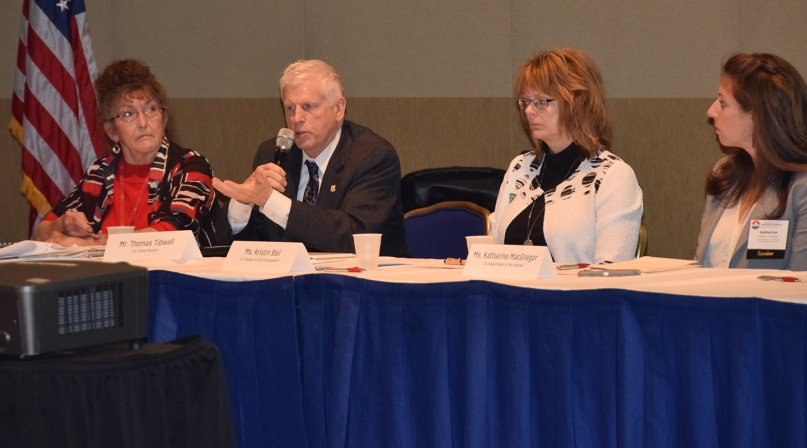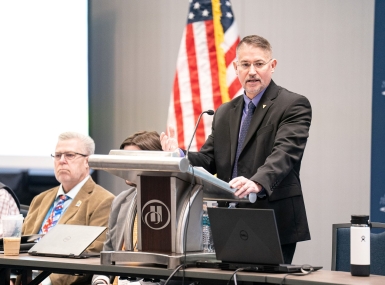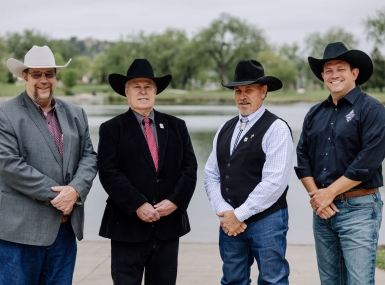Public Lands Steering Committee Federal Land Managers Panel
Upcoming Events
Related News

As the Trump Administration awaits confirmation of U.S. secretary of the interior designee Rep. Ryan Zinke (R-Mont.), the agency is plotting a way forward.
“We can’t have an America First energy strategy without looking at responsible use of federal lands, but it also can’t be done under a multitude of layers of federal regulation,” Katharine MacGregor told the Public Lands Steering Committee, Saturday afternoon.
MacGregor is the newly-appointed special assistant to the secretary of the interior, who could confirmed as early as Wednesday.
“It’s going to be important to getting back to a balance of conversation and access to federal lands,” she added.
Kristin Bail, acting director of the Bureau of Land Management, gave a summary of what role public lands have played in energy production recently.
In FY15, 11 percent of natural gas and 7 percent of oil came from public lands. In 2016, the bureau sold 4.36 billion tons of coal, for a total of $61.4 billion.
It’s not just extraction, either. Since 2009, the agency has approved 55 renewable energy projects, including 32 solar projects, 11 wind farms and 12 geothermal projects.
But in addition to generating energy, the interior department has to protect its land, which has been increasingly threatened by fire.
The increasing cost of fighting fires has forced the Forest Service to cut staff by 40 percent since the 1990s, bringing its total number of foresters to half of what it was in 1998. Nevertheless, Director Tom Tidwell said the agency managed to restore 5.3 million acres in 2016 and sell 2.9 million board-feet of timber.
Fire management accounted for 56 percent of the forest service’s budget in 2016, compared to 15 percent in the late ‘90s.
“We have to reset our thinking on average fire seasons, it’s not what it was,” he said. “By 2025, it’s projected the cost of fighting fires will be 67 percent of our budget.:”
Some labor help came thanks to the Good Neighbor Agreement, an authority expanded by the 2014 Farm Bill, which has allowed the department to work with other entities to do forest service work.
“Good Neighbor authority allows us to work in partnership with the states, to be able to use state staff and state resources to put projects together and have state employees administer timber sales contracts, which gives us additional capacity to get work done,” he said. “(Good Neighbor Authority) has tremendous potential, its our best opportunity to get work done and create more jobs.”
Fire concerns extend beyond forest service land.
“In remote areas, the rural and rangeland fire protection organizations have been valuable partners,” Bail said, mentioning the training and equipment BLM provides in exchange. “Often rangers who can respond very quickly where it can take the closes BLM crews too long to respond.”
This post has been edited to correct the timeframe for Forest Service staff reductions.
Attachments
Related News

U.S. Department of the Interior announces PILT funding of $644.8 million to be distributed to counties
On June 24, the U.S. Department of the Interior (DOI) announced that over 1,900 state and local governments nationwide will receive $644.8 million in Payments in Lieu of Taxes program (PILT) funding for 2025. A complete list of funding by state and county is available here. You can also check NACo’s County Explorer for detailed county-by-county information on 2024 PILT funding levels.

BLM, HUD target public lands for housing
A multi-agency push could open up hundreds of thousands of BLM acres near towns and cities to development for attainable housing.

WIR grows membership, offerings in South Dakota
Members of NACo’s Western Interstate Region learned about and fueled the work being done by the National Center for Public Lands Counties at the WIR Conference in Pennington County, S.D.